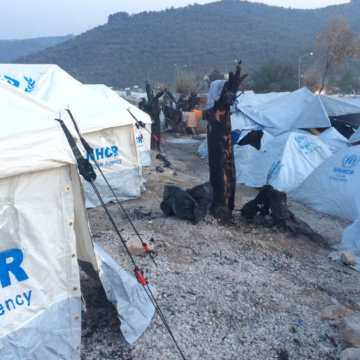- About
- Topics
- Picks
- Audio
- Story
- In-Depth
- Opinion
- News
- Donate
-
Signup for our newsletterOur Editors' Best Picks.Send
Read, Debate: Engage.
| located: | Greece |
|---|---|
| editor: | Maria João Morais |
Winter is well on its way and bitterly cold temperatures have gripped even the southernmost parts of Europe, usually associated with sun-soaked beaches. These include the Greek islands of Lesvos, Chios, Samos, Leros or Kos, where thousands of refugees remain trapped. Besides being exposed to harsh conditions and adverse weather, these asylum seekers have been neglected and abandoned by the European authorities.
Despite the freezing temperatures, refugees, including pregnant women and very young children – some unaccompanied – are living in overcrowded and unsafe camps; in makeshift tents, sleeping on the ground. Access to clean water is limited, as are sanitation facilities and health services, a situation that has been deteriorated by this year’s cut in EU emergency funding to aid agencies that operate in the Aegean islands.
The critical situation has led to several international humanitarian groups, including Human Rights Watch and Oxfam to urge Alexis Tsipras' government and the European Union to take urgent action in relocating asylum seekers before climate conditions worsen further.
In a campaign that began last week, activists pleaded with Greece to end the so-called "containment policy" put in place as part of the EU-Turkey deal agreed in early 2016. The accord, designed to slow migrant arrivals to Europe, has been exacerbating the refugee problem, since it prevents them from entering the European mainland until requests are approved, forcing them to remain in the camps in the meantime. This very slow and bureaucratic process has, in some cases, reached up to 20 months. At the same time, the level of migrants taken in remains low: according to recent data, only 30% of refugees that the EU allocated in 2015 have arrived in their host countries.
More than two years after the outbreak of the refugee crisis, with winter setting in, the latest Greek emergency is unfortunately highlighting, once again, the overall failure of the EU regarding the protection of migrants that are fleeing war or famine in their home countries.
